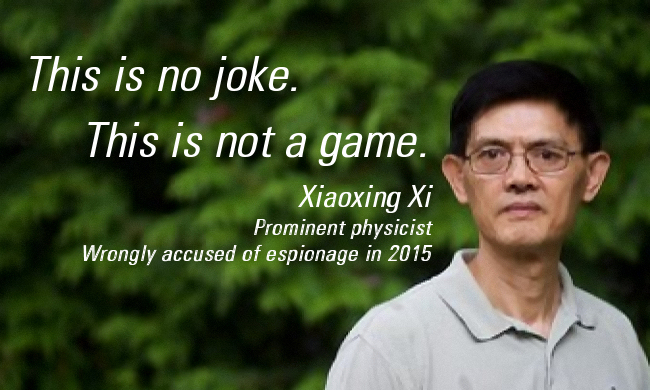
Earlier this week, I gave a standing-room only talk at Yale about the Asian American Model Minority Myth, wherein I talked about the Myth’s anti-Black underpinnings and its dehumanizing obfuscation of the struggles (and very real racism) faced by the diverse people who belong to the AANHPI community. Afterwards, a young Chinese American woman came up to me and introduced herself: her name was Joyce. Earlier this year, her father (Temple University physics professor and former department chairman, Xiaoxing Xi) had been arrested by the Justice Department and wrongly accused of espionage. In 2002, Xi had worked at a company that had invented something called a pocket heater, which is now a restricted technology used in superconductor research. Later, Xi purchased limited access to the technology for one year to continue his research on it.
In an emotional and heartfelt op-ed published this past week, Joyce recounts how in May of this year, the US Justice Department raided the Xi family home. Twelve FBI agents broke into the house in the early morning hours and pointed guns at a bewildered and terrified Xi, his wife, and their children. The agents dragged Xi away in handcuffs, and accused him of sharing the pocket heater schematics with Chinese scientists in 2010, in a series of emails. They implicated Xi — a US citizen who naturalized in 1989 — as a Chinese spy. In addition to facing federal charges of espionage, Xi became informally black-listed: before even having a chance to defend himself in a court of law, Xi found himself demoted from his departmental chairmanship by Temple University.
One inconvenient problem: Xi appears to be completely innocent.
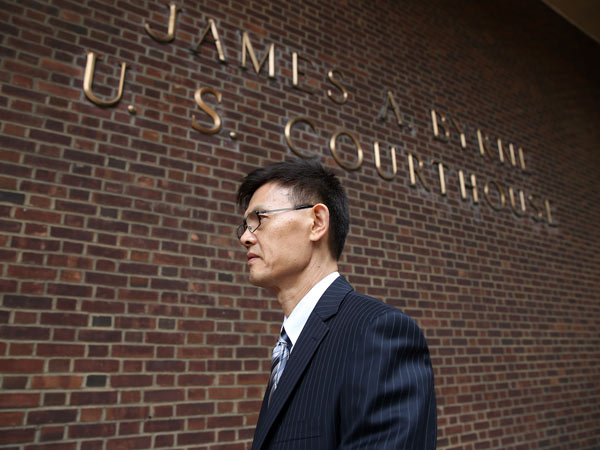
This past week, the Justice Department dropped all the charges against Xi after several experts — including the co-inventor of the pocket heater technology — filed sworn affidavits testifying that the schematics shared between Xi and the Chinese scientists was neither for a pocket heater, nor for any other restricted technology. It might as well have been for a homemade clock.
Reports the New York Times:
It was an embarrassing acknowledgment that prosecutors and F.B.I. agents did not understand — and did not do enough to learn — the science at the heart of the case before bringing charges that jeopardized Dr. Xi’s career and left the impression that he was spying for China.
“I don’t expect them to understand everything I do,” Dr. Xi, 57, said in a telephone interview. “But the fact that they don’t consult with experts and then charge me? Put my family through all this? Damage my reputation? They shouldn’t do this. This is not a joke. This is not a game.”
Xi is only the latest Asian American victim of the federal government’s growing reliance on racial profiling to prosecute the Obama Administration’s declared war on domestic espionage. Late last year, hydrologist Sherry Chen — also an American citizen — was accused of downloading and sharing secret information about American dams with Chinese officials; however, detailed inquiry into the incident at the heart of the charges against Chen suggest that although she may have borrowed a colleague’s password to access information (that she also had clearance to view) about America’s dams in a government database, she apparently never shared that information (nor intended to share that information) with anyone overseas.
The espionage charges against Sherry Chen were dropped in March of this year, but not before Chen faced public and professional humiliation stemming from the investigation.
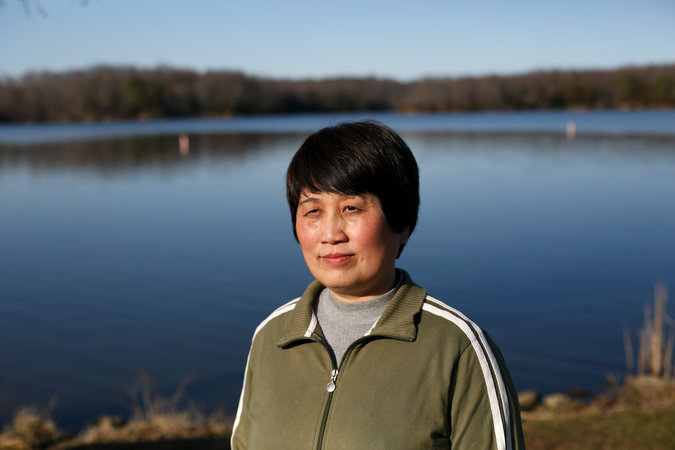
The New York Times reports that the Obama Administration has quietly undertaken a domestic “dragnet” for Chinese spies, which has resulted in a nearly 60% increase in investigations: most target Asian nationals legally residing in the United States, or naturalized Asian American citizens. While some investigations might yield successful prosecutions of spies, a disturbingly high number of these investigations appear to lack any credible evidence of wrongdoing and appear built predominantly around racial profiling. Often, the stories are the same: an (Asian American) person is targeted, investigated, arrested and charged with espionage — frequently for having committed only routine and misdemeanor errors, or for having done nothing wrong at all.
In many of the cases, non-White skin colour alone appears to be taken as “just cause” for drawing the attention of federal authorities. As Xi’s lawyer said to the Times earlier this month:
“If he was Canadian-American or French-American, or he was from the U.K., would this have ever even got on the government’s radar? I don’t think so,” Mr. Zeidenberg said.
The list of Asian Americans who have found their lives wrongfully and unjustly upturned in this “dragnet” is long, and worrying. We all know the story of Wen Ho Lee, the Taiwanese American nuclear scientist indicted in 1999 on espionage charges stemming from the wrongful accusation that he was selling nuclear secrets to the Chinese government. Of course, Asian Americans would immediately smell something fishy — why would a Taiwan-born scientist be loyal to the Chinese Communist Party? Lee was cruelly jailed for nearly a year in solitary confinement before most of the charges against him were dropped; eventually, President Clinton issued a formal apology to Lee for his gross, racially-tinged mistreatment. Despite being absolved of most wrongdoing, Lee was essentially black-listed from the scientific community and forced into retirement.
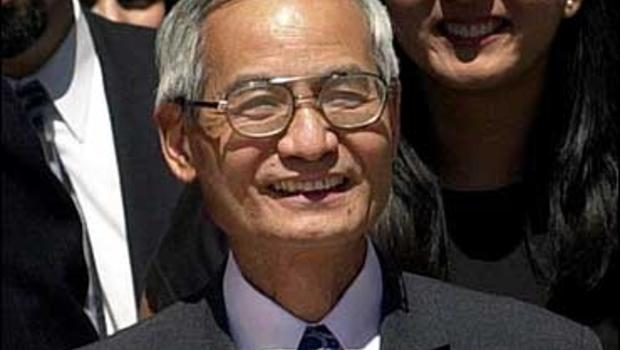
What should terrify us is that nearly 15 years after Wen Ho Lee’s experiences, the number of people — most Asian American — finding themselves targeted, racially profiled, and black-listed like Lee is on the rise. Even more disturbing is the broad (and likely unconstitutional) invasion of privacy being used by the government to engage in these investigations of Asian American residents and citizens. In July of 2015, two Chinese nationals — Mo Hailong and his sister, Mo Yun — were arrested and charged with a plot to steal patented corn seeds from Monsanto for Chinese agribusiness competitors; Mo Hailong has spent two years in jail awaiting trial, while the charges against Mo Yun were quietly dropped in July. A secret FISA warrant — which are obtained with limited judicial oversight, and which stand at the heart of the controversy over the NSA’s possibly unconstitutional domestic surveillance programs — was used to intercept almost all of Mo Hailong’s communications. The Obama Administration has also apparently adopted a broad interpretation of the century-old 1917 Espionage Act to persecute suspected spies, a large number of whom are Asian American.
Even government employees do not appear to be immune to this new Red Scare. In a particularly disturbing story, a mid-level State Department analyst, Stephen Kim (who is Korean American) was charged in 2010 with espionage for supposedly leaking a classified memo to a reporter.
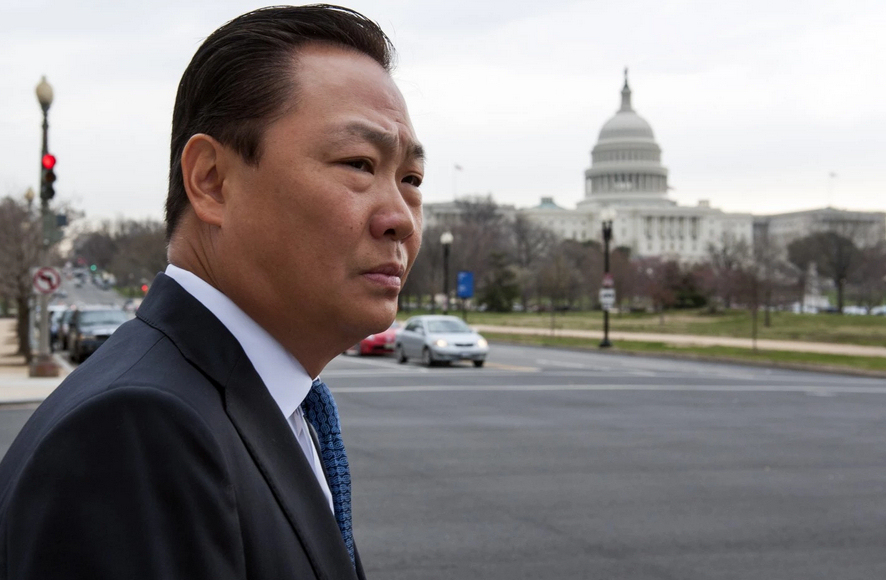
The State Department arrested Kim and charged him with handing over state secrets to the reporter — who later wrote a story about the information and was himself never charged with a crime related to the supposed espionage — with the explanation that Kim was loyal to North Korean interests and was seeking to sabotage the US government. Yet, no evidence of Kim commiting such a crime was ever uncovered, and many have pointed out that the reporter was in touch with several analysts with access to the secret document. Yet, federal authorities focused their attention — inexplicably — on Kim. When they went to arrest him, they used racially charged language, calling Kim and other Asians “you people”. Kim fought the espionage charges against him for five years, before bankruptcy associated with the rising legal costs forced him to accept a plea deal and agree to a 13-month prison term. But, one can’t help but wonder if Kim was suspected of espionage because of racial profiling, motivated by Yellow Peril fears. Is Kim now in jail for a crime he didn’t commit? Is Kim, in essence, serving time for being Asian American?
Two years ago, the Washington Post reported that anti-Asian racial profiling is not a rarity in the Obama Administration; rather, it appears to be part of the norm. Official guidelines limiting clearance for anyone with potential for “foreign influence” essentially bars Asian American and Muslim State Department and FBI agents from being assigned to many jobs. Often, the “foreign influence” clause of these agencies’ preclusion policy appears to be based on little more than shared ethnic or religious identity with that of a major foreign power. Writes the Post in their report on the State Department:
The greatest harm of the preclusion policy, besides losing the benefit the skills of native language speakers, may be how it projects an image of distrust. Several foreign service officers brought up the historical example of Japanese Americans being interned during World War II, as well as the persecution of Wen Ho Lee, the Los Alamos scientist who was wrongfully accused of leaking information to the Chinese. Asians are no strangers to the suspicion that they might be serving another master.
For example: When Kendrick Liu was applying to serve on the D.C.-based desk that deals with China and Mongolia, he says he was asked to submit information about relatives who were foreign-born U.S. citizens, and was ultimately denied the position on security grounds (Diplomatic Security had previously forced him to forego an assignment in Hong Kong as well).
“It seemed to me they were making distinctions between American citizens and American citizens who were’t born in the United States, which in my mind seemed odd,” Liu says. “Because as I was taught to understand it, an American citizen is an American citizen, period.”
And then there’s Andrew Ou, a Korean-born officer who spent time on a fellowship program in Japan. Years after being told he couldn’t serve in Japan for security reasons, he requested his files under the Freedom of Information Act. They contained copious notes about work he’d done for a Japanese official, as well as a Japanese girlfriend. The preclusion was later reversed, but barely.
“I’m American, and this whole process challenged that concept,” Ou says. “I was surprised, I was angry, I was bitter.”
At my talk on Wednesday, Joyce wondered how I might connect the Model Minority Myth with the heinous and arguably racist treatment that her father had faced at the hands of the federal government. Here’s how: the Model Minority Myth is predicated upon Asian American performance of model behaviour. But, our status as the “model minority” is precarious. “Model minority” status relies upon the performance of certain desirable behaviours. As soon as individuals or communities fail (or reject) participation in the performance, we find ourselves cast out.
Thus, we learn that the Myth is no immunization from racial mistreatment: it merely serves to obscure and distract from America’s much older racist disdain of Asian Americans, as the untrustworthy Perpetual Foreigner and harbingers of Yellow Peril. The Model Minority Myth does not symbolize some sort of post-racial acceptance of Asian Americans: it merely disguises the kind of centuries old anti-Asian racism that still bubbles beneath America’s surface. But that racism is still there; we can see those Yellow Peril fears of Asian faces resurface in how the US government has treated Wen Ho Lee, Sherry Chen, Xiaoxing Xi and so many others.
Lately, Sinophobic and anti-immigrant rhetoric is on the rise, particularly from the American Right. Why aren’t we focusing on the human cost to this rising, racist, McCarthy-esque witch-hunt? Why aren’t we demanding some accountability for how the Obama Administration is routinely wrecking the lives of Asian Americans and their families based on faulty evidence and racial prejudice?
My father’s case reflects some of America’s most cherished ideals gone wrong. My father is a hard-working, innocent American who was presumed guilty. He devoted his life to academic research, for the sake of understanding the world around us better and contributing to his university and country — America. He had all that taken away from him in an instant.
This is happening, folks. All the time, to all sorts of Asian American people. We need to stop and pay attention.
It’s true that Asian Americans do not look like most Americans’ stereotype of the average American; but that does not make us any less American. Bobby Jindal has accused immigrants who fail to assimilate as foreign invaders; yet, one wonders how the kind of assimilation Jindal praises is possible in a country that treats any person with yellow or brown skin as innately foreign and implicitly disloyal.
One shouldn’t be asking why immigrants “won’t assimilate”. One should be asking what it will take for America to finally see its foreign-born Americans as actually American?
Update: If you have a few extra dollars, please contribute to Professor Xiaoxing Xi’s official legal fund, set up by himself and his family.
